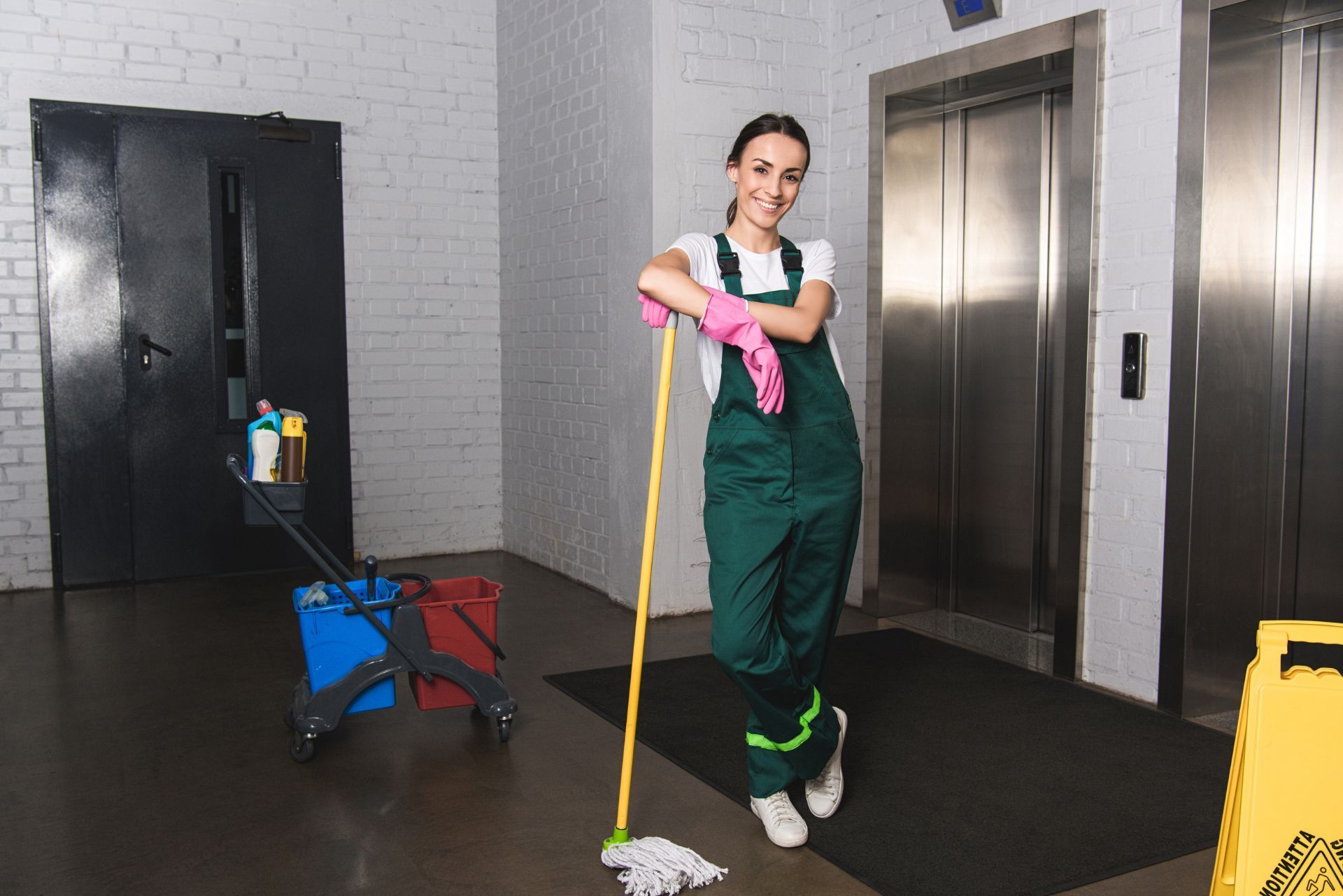Top 3 Recommended Policies

In an industry projected to grow significantly in the coming years, janitorial services play a vital role in maintaining cleanliness and hygiene across commercial and residential spaces. The global janitorial services market, for instance, is expected to expand from $297.47 billion in 2022 to over $441 billion by 2027, reflecting a robust demand fueled by sectors such as real estate and facility management. With such growth comes increased responsibility and risk, making janitorial services insurance an essential safeguard for companies operating in this field. This article explores the key aspects of janitorial services insurance, why it matters, and how businesses can protect themselves effectively.
Understanding the insurance landscape in this sector is crucial for owners and managers who want to mitigate risks related to property damage, employee injuries, and operational disruptions. According to THREE Business Insurance, companies that maintain buildings face various risks that can lead to unexpected expenses, making coverage for people, property, and operations indispensable.
Why Janitorial Services Insurance Is Essential
Janitorial companies operate in environments where accidents and liabilities are common. From slips and falls to damage caused during cleaning, the risks are diverse and can result in costly claims. Insurance helps businesses manage these risks, ensuring financial stability and continuity.
One of the primary reasons insurance is critical is the protection it offers employees. Janitors often work with chemicals, machinery, and in potentially hazardous conditions. Workers’ compensation insurance covers medical expenses and lost wages if an employee is injured on the job, which is a fundamental component of janitorial services insurance.
Moreover, liability insurance protects businesses if a client or third party suffers injury or property damage due to the company’s operations. For example, if a janitor accidentally damages expensive equipment or causes a slip-and-fall accident, liability coverage can help cover legal fees and settlements.
Coverage for Property and Equipment
Janitorial businesses rely heavily on equipment such as vacuum cleaners, floor buffers, and cleaning chemicals. Property insurance safeguards these assets against theft, fire, or accidental damage. Without proper coverage, replacing damaged equipment can be a significant financial burden.
Additionally, janitorial services insurance often includes coverage for the client’s property. If a cleaning company causes damage to a client’s premises, insurance can cover repair or replacement costs, preserving client relationships and protecting the company’s reputation.
Furthermore, having comprehensive insurance can enhance a janitorial company’s credibility in the eyes of potential clients. Many businesses prefer to work with insured contractors, as it demonstrates a commitment to professionalism and risk management. This can be a deciding factor when clients are choosing between multiple service providers. In an industry where trust and reliability are paramount, being fully insured can set a company apart from its competitors.
Another important aspect of janitorial services insurance is the coverage for environmental liabilities. As cleaning companies increasingly use eco-friendly products and practices, they must also consider the potential risks associated with these materials. Pollution liability insurance can protect against claims arising from the use of hazardous substances, ensuring that the company is prepared for any unforeseen consequences of their cleaning methods. This not only safeguards the business financially but also aligns with the growing demand for sustainable practices in the industry.

Market Trends Impacting Janitorial Insurance Needs
The janitorial services industry is evolving, and these changes influence insurance requirements. For example, the adoption of green cleaning practices is growing, with approximately 48% of commercial cleaning companies in the US implementing environmentally friendly methods. This shift not only reflects a commitment to sustainability but also introduces new types of equipment and chemicals that may require specialized insurance coverage. Furthermore, the increased use of eco-friendly products often necessitates training for staff to ensure proper handling and application, which can lead to additional liability considerations that must be factored into insurance policies.
The industry’s size and economic impact are substantial. Employing over 2.3 million people in the US alone, janitorial services contribute significantly to the economy. The average annual revenue per commercial cleaning business is around $650,000, highlighting the scale of operations that need protection through comprehensive insurance policies. Additionally, as the workforce becomes more diverse, with a growing number of employees from various cultural backgrounds, janitorial companies are recognizing the importance of inclusive workplace practices. This cultural shift not only enhances employee satisfaction but also introduces new dynamics in training and operational procedures, which can further influence insurance needs.
However, the market is not without its challenges. A recent report from Vertical IQ noted a 7% year-over-year decline in total portfolio sales in the cleaning and hygiene sector during early 2025, signaling a recalibration post-pandemic. This adjustment underscores the importance of risk management and insurance in maintaining business resilience during fluctuating market conditions. Companies are now more than ever focusing on building contingency plans and diversifying their service offerings to mitigate risks associated with economic downturns, which can also lead to increased insurance premiums as businesses seek more comprehensive coverage to protect against potential losses.
Economic Growth and Industry Performance
Commercial cleaning services account for over 70% of janitorial companies’ revenue, making economic trends a primary factor in industry performance. As businesses expand and new commercial properties emerge, demand for janitorial services rises, increasing exposure to risks and the need for robust insurance coverage. Furthermore, the rise of remote work has altered the landscape of commercial real estate, leading to fluctuations in demand for cleaning services in office spaces. Companies are now adapting their strategies to cater to a hybrid workforce, which may require more frequent cleaning of shared spaces and common areas, thereby affecting their insurance liabilities and coverage needs.
In addition to these shifts, technological advancements are reshaping the janitorial industry. The integration of automation and smart cleaning technologies is becoming more prevalent, with robotic cleaners and IoT devices enhancing efficiency and effectiveness. While these innovations can reduce labor costs and improve service delivery, they also introduce new risks related to equipment malfunction and cybersecurity threats. As janitorial companies invest in these technologies, they must also consider the implications for their insurance policies, ensuring they are adequately covered against potential liabilities arising from the use of advanced cleaning solutions and the data security of connected devices.
Types of Insurance Coverage for Janitorial Services
Janitorial companies typically require a combination of insurance policies tailored to their specific risks. Understanding these types of coverage helps business owners make informed decisions.
General Liability Insurance
This is the cornerstone of janitorial services insurance. It covers bodily injury, property damage, and personal injury claims resulting from business operations. For example, if a client slips on a wet floor after cleaning, general liability insurance can cover medical costs and legal fees. Additionally, this coverage can protect against claims arising from advertising injuries, such as false advertising or copyright infringement, which can be particularly relevant for companies that promote their services through various media channels.
Workers’ Compensation Insurance
Given the physical nature of janitorial work, injuries are a common risk. Workers’ compensation insurance provides wage replacement and medical benefits to employees injured on the job, protecting both workers and employers from financial hardship. This insurance not only covers injuries like slips and falls but also extends to occupational illnesses, such as respiratory issues caused by exposure to cleaning chemicals. By investing in this coverage, janitorial companies can foster a safer work environment, which can ultimately lead to higher employee morale and retention.
Commercial Property Insurance
This coverage protects the business’s physical assets, including cleaning equipment and office space, against risks like fire, theft, and vandalism. For janitorial companies, this ensures that critical tools and premises are safeguarded. In addition to covering tangible assets, commercial property insurance can also include business interruption coverage, which compensates for lost income if the business is temporarily unable to operate due to a covered event. This aspect is crucial for maintaining financial stability during unforeseen disruptions.
Business Auto Insurance
Many janitorial companies use vehicles to transport staff and equipment. Business auto insurance covers accidents involving these vehicles, which is essential for companies with mobile operations. This coverage not only protects against liability for injuries or damages caused by company vehicles but also covers physical damage to the vehicles themselves. Furthermore, it can extend to include coverage for hired and non-owned vehicles, ensuring that all transportation needs are adequately addressed, especially in cases where employees use their personal vehicles for business purposes.
Professional Liability Insurance
Also known as
errors and omissions insurance, this protects against claims of negligence or inadequate work. While less common in janitorial services, it can be relevant for companies offering specialized cleaning or consulting services. For instance, if a company is hired to clean a sensitive environment, such as a medical facility, and fails to meet the required standards,
professional liability insurance can help cover the costs of legal defense and any settlements. This type of coverage can enhance a janitorial company's credibility, demonstrating a commitment to quality and accountability in their services.
How to Choose the Right Insurance for Your Janitorial Business
Selecting the appropriate insurance coverage requires a thorough assessment of your business’s unique risks and needs. Factors to consider include the size of your company, the types of clients you serve, and the specific services you offer. For instance, if your janitorial business specializes in high-security environments, such as hospitals or government buildings, you may need specialized coverage that addresses the heightened risks associated with those settings.
Working with an insurance broker experienced in janitorial services can provide valuable insights and help tailor a policy that balances coverage and cost. It’s also important to regularly review and update your insurance as your business grows or changes. As you expand your services or client base, the risks you face may evolve, necessitating adjustments to your coverage to ensure you remain adequately protected.
Risk Management and Employee Training
Insurance premiums can be influenced by the level of risk associated with your operations. Implementing strong safety protocols and providing comprehensive employee training can reduce accidents and claims, potentially lowering insurance costs. For example, conducting regular safety drills and ensuring that all employees are familiar with emergency procedures can significantly mitigate risks in the workplace.
Engaging janitorial staff in data curation and operational feedback, as highlighted in a 2021 study on facility management, can improve service quality and risk awareness, further supporting a safer work environment. Additionally, fostering a culture of safety and accountability among your team can lead to proactive identification of hazards and encourage employees to take ownership of their roles in maintaining a secure workplace. This not only enhances the overall safety of your operations but can also improve employee morale and retention, as staff feel valued and empowered in their contributions to the business.

The Future of Janitorial Services and Insurance
As the janitorial industry continues to grow and evolve, insurance products will also adapt to emerging trends and challenges. Increased emphasis on sustainability, technological integration, and post-pandemic operational shifts will shape the types of risks businesses face. For instance, the rise of eco-friendly cleaning products and practices is not just a trend but a necessity as clients increasingly demand greener solutions. This shift towards sustainability can lead to new liabilities and considerations for insurance providers, who must ensure that their policies cover potential environmental impacts and compliance with evolving regulations.
Staying informed about market developments and maintaining comprehensive insurance coverage will be key to long-term success. With the global janitorial services market projected to reach $441.54 billion by 2027, businesses that proactively manage their risks are better positioned to thrive. Moreover, the integration of technology, such as automated cleaning equipment and software for managing operations, introduces both efficiencies and new risks. Companies must consider how to protect their investments in technology while also addressing cyber liability as they collect and store more data than ever before.
For more detailed insights on market growth and industry trends, the
PR Newswire report offers valuable data on the expanding janitorial services market. Additionally, as the industry adapts to these changes, training and workforce development will become increasingly important. Companies that invest in their employees through ongoing training and education will not only enhance service quality but also reduce the likelihood of accidents and claims, further impacting their insurance needs and premiums.
Conclusion
Janitorial services insurance is not just a regulatory requirement but a strategic investment that protects businesses from unforeseen liabilities and operational disruptions. By understanding the types of coverage available and aligning them with their specific risks, janitorial companies can safeguard their employees, assets, and reputation.
As the industry navigates economic fluctuations, sustainability trends, and evolving client expectations, comprehensive insurance coverage remains a cornerstone of resilience and growth. Business owners should prioritize risk management and insurance planning to ensure their janitorial services thrive in a competitive and dynamic marketplace.
Contact Us
Phone
Location
